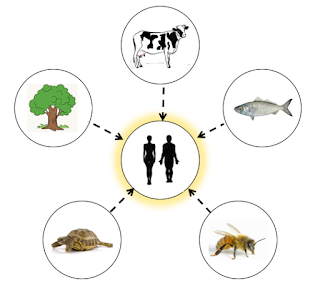Language and the composition of social reality
By Rodrigo Cáceres
In previous essays, we have been talking about the close relationships between language, frames, meaning, ethical values and social reality (you can take a look here for definitions). If we think about it, these discussions tend to change our traditional idea about what language is.
Generally, we think that language is a passive instrument, that allows us to "describe" a preexisting reality or to "express" our subjective experiences. In general, we think that language allows us to talk "about" things.
Conversely, we have been saying that language is an active and generative system, that language creates social reality. The linguist Michael Halliday (2007) would say that language is a semogenic system, in other words, it is a system that creates meaning.
As an example, we have seen how talking about nature as a child generates a set of meaningful practices of respect, protection and caretaking of nature; as well as we have seen how talking about nature as a collection of resources generates a radically different set of meaningful practices, that objectify nature, exploit and destroy it.
We could also see how the "meaningfulness" of both sets of practices are ethically incompatible with each other. In simple words, this means that the practices of the "nature is resource" community seem immoral and absurd for the "nature is child" community, and viceversa.
We should understand both ideas of "nature is resource" and "nature is child" as metaphors. Lakoff and Johnson (1980) claim that "the essence of metaphor is understanding one thing in terms of another". In a nutshell, metaphors allow us to grasp an abstract idea (such as time, value, relationships, logic, nature, etc.) in terms of familiar human experiences (such as temperature, space, vision, movement, being a child or a parent, etc.).
Retaking our example, nature is an abstract concept since it is a mass noun. Furthermore, the question of how we should relate to nature is far from being a straightforward issue, making it also an abstract problem. Thus, in order to make these abstractions tangible, one can use the metaphor of "nature is our child". We've all been children, so we know what it is like to be taken care of, protected, defended, nurtured and (unconditionally) loved. So the experience of being a child makes it easy to understand how we should treat nature: we should protect it, defend it, nurture it and love it.
Thereafter, when a community shares and recreates the "nature is our child" metaphor, this metaphorical structure gets physically realized in the form of neural circuits in the brain (Lakoff, 2010). Since the synapses in neural circuits are made stronger the more they are activated, the repetition of the concepts associated to this metaphor (e.g. care, child, nurture, love) strengthens the circuits for this same metaphor in the hearer's brain. This is precisely how what we usually call "mindset" or "mentality" gets constructed.
You may be familiar with a widespread idea nowadays, namely that the ecological crisis will be solved with a "change in mindsets". What this neurological evidence tells us is that mindsets are intimately linked with the language we use. Consequently, the ecological transition of modern cultures will inevitably require a language transition.
As we can see, the metaphors we use are crucially important because they shape our social reality as well as individual mindsets. Suzanne Romain (1996) has put this very eloquently when she affirms that "It matters which metaphors we choose to live by. If we choose unwisely or fail to understand their implications, we will die by them".
...Fortunately, in these essays we have been able to understand already the metaphor of "Nature is a collection of resources" and its implications concerning the destruction of life on Earth. As an alternative, we have discovered the life-affirming frames of "Nature is family". Now it's up to us to carry out this transition.
References
References
Halliday, M. A. K. (2007). On matter and meaning: the two realms of human experience. Linguistics and the Human Sciences, 1(1), 59-82.
Lakoff, G., & Johnson, M. (1980). Metaphors we live by.
Lakoff, G. (2010). Why it matters how we frame the environment. Environmental Communication, 4(1), 70-81.
Romaine, S. (1996). War and peace in the global greenhouse: Metaphors we die by. Metaphor and Symbol, 11(3), 175-194.
Lakoff, G., & Johnson, M. (1980). Metaphors we live by.
Lakoff, G. (2010). Why it matters how we frame the environment. Environmental Communication, 4(1), 70-81.
Romaine, S. (1996). War and peace in the global greenhouse: Metaphors we die by. Metaphor and Symbol, 11(3), 175-194.




Comments
Post a Comment